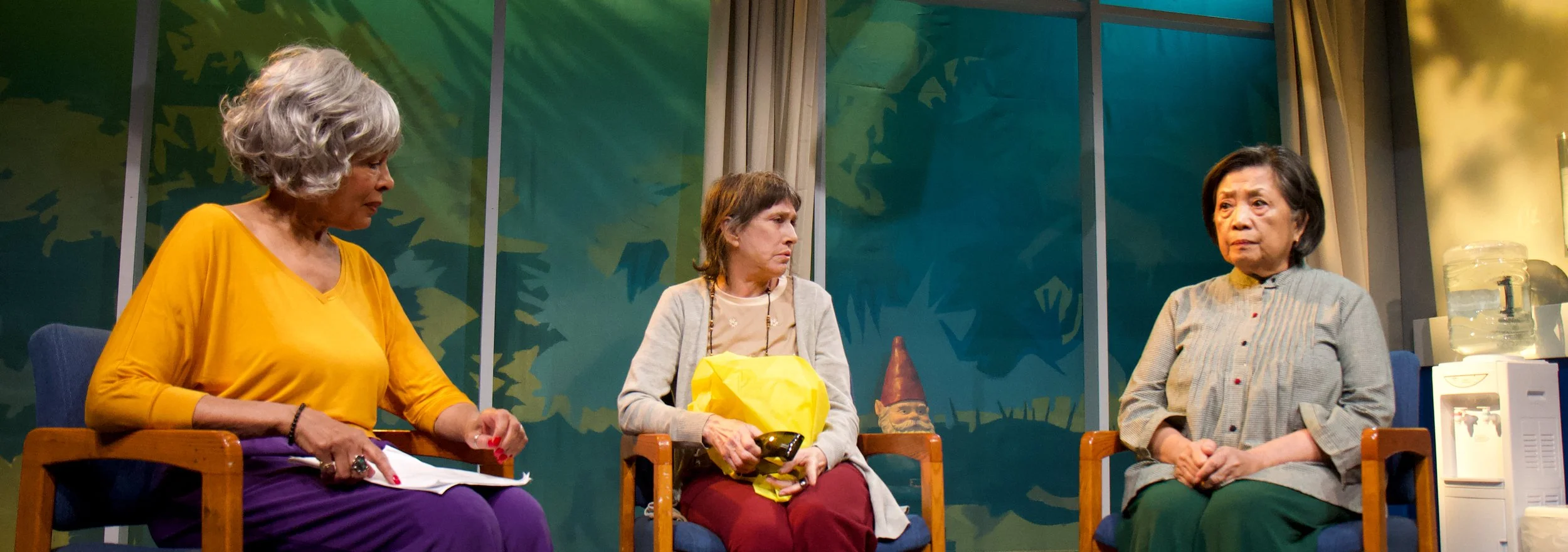Greek tragedies are a lot like daytime television, only trashier. They spill over with juicy plots and wicked details that read like a tabloid rag at the supermarket checkout. The worlds of Medea, Phaedra, Oedipus, and Electra are populated by infanticide, matricide, incest, madness, and cosmically bad luck, all of which makes them ripe for one thing: parody. The Grift, in association with Bay Bridge and Push Productions, accomplishes just that with Jason Pizzarello's spoof-tacular new play, Saving the Greeks: One Tragedy at a Time, a breezy comedy full of laugh-out-loud merriment that pays homage to the melodramatic absurdity that is Greek tragedy. The plot is pure silliness, which is perhaps why it works so well. Tired of war and death, Dialysis (Brian Reilly) and Peon (Brian Normant) set out to bring some much-needed peace to ancient Greece. Their efforts lead them to create Betterland, a city where formerly doomed tragedians can start their lives over free from the misfortunes of their previous existences. Traveling from tragedy to tragedy, Dialysis and Peon gather inhabitants for their new utopia.
Their first stop is Thebes, where they discover Oedipus (Tom Escovar) on the verge of blinding himself after having realized he has slain his father and bedded his mother. After saving Oedipus with the help of the blind soothsayer Teiresias (Alan Jestice), the tragically hip group makes its way to King Agamemnon's (Eric Forand) castle. There they successfully convince the bipolar Electra (Carrie McCrossen) not to kill the fatalistic Clytemnestra (Eva Patton).
Feminist outcast Lysistrata (Season Ogelsby) joins next, fighting her obvious sexual attraction to Dialysis, while Oedipus finds love (or at least lust) with Agamemnon's mistress, the psychotic seer Cassandra (Carey Evans). No sooner does doomsday housewife Medea (Valerie Clift) join the gang than they find themselves under attack by a neighboring city. When someone (literally) kills the messenger (Matthew DeVriendt), an infuriated Zeus (William Harper Jackson) steps off Mount Olympus to clean up the big mess.
Jason Pizzarello has written a thoroughly enjoyable script filled with droll witticisms, amusing one-liners, and groaning wordplay. He turns the Greek tragedy genre on its ear, gleefully exploiting the farcical possibilities and mining its rich comedic potential. Pizzarello's only misfire is his ill-conceived chorus. Although the chorus is an integral component of Greek tragedy, here it is extraneous and often disruptive, and its one-joke role grows tiresome.
Pizzarello's script is well matched in director Michael Kimmel. He has a firm grasp on his cast, guiding them to truly funny performances. Kimmel never takes the script too seriously, allowing the absurdities to pile up with giddy abandon. The one downside of his direction is his tendency to allow his actors to play to the audience, an off-putting choice that breaks the play's flow.
The actors are excellent. Embracing the ridiculousness of this farcical parody, the cast of 13 plays each line for all its worth. Jestice sets the self-deprecating tone with his opening monologue and keeps the action moving, delivering loads of zany zingers as Teiresias.
Reilly and Normant are sublime as Peon and Dialysis, making for a comedic dream team as they interact with a natural ease. McCrossen and Evans are effortlessly hilarious as the inexplicably British Electra and the crazy-nuts Cassandra. Forand, without ever changing costumes, plays four variations of the same role to dim-witted perfection.
Clift is a comedic gift. She morphs from the slightly off-kilter Jocasta to the oddly crazy Phaedra to the certifiably insane Medea without ever missing a beat. Oglesby, DeVriendt, Escovar, Harper Jackson, Patton, and Pete Mele lend outstanding support within this accomplished cast.
Despite a second act that drags in spots, Saving the Greeks ascends to Olympian heights. Pizzarello's clever script offers madcap adventures for these time-honored characters, and Kimmel and his first-rate cast prove this show is anything but a tragedy.






